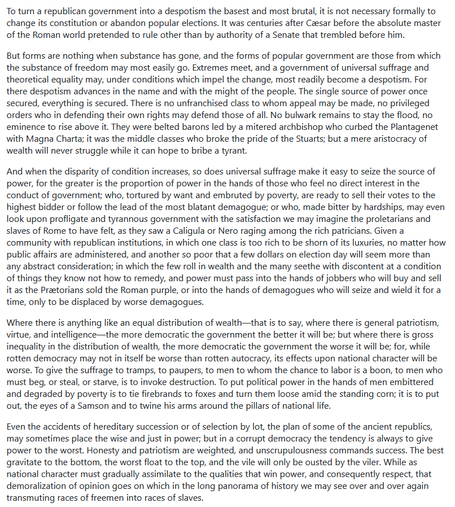@Dianora There are a few other economic concepts which are IMO key to developing any remedies and/or alternatives. I'll try to touch on the major ones here.
Wage/Rent pricing, mentioned above, is a key stumbling point. Smith:
A man must always live by his work, and his wages must at least be sufficient to maintain him. They must even upon most occasions be somewhat more, otherwise it would be impossible for him to bring up a family, and the race of such workmen could not last beyond the first generation.
https://en.wikisource.org/wiki/Page%3AThe_wealth_of_nations%2C_volume_1.djvu/135
The Law of Rent and Iron Law of Wages (https://en.wikipedia.org/wiki/Law_of_rent https://en.wikipedia.org/wiki/Iron_law_of_wages) dictate that these dynamics are always in conflict and play, and crush the working class, most especially those who live by wage labour (or worse: piecework pay, see Smith's discussion of this for an eye-opener), and rent rather than own their domeciles. Both concepts date to the 18th / early 19th centuries, but are largely ignored in contemporary orthodoxy.
The "obvious" solutions, of, say, providing free/subsidised essentials to the working class or of critical goods and services (food, clothing, housing, education, healthcare) largely further exacerbate the existing perverse market dynamics. I am not saying DON'T help those in dire need. What I am saying is that if this is the sole and widespread remedy, that the underlying problems get worse: wages fall (because "welfare" benefits subsidise its costs rather than employers paying a living wage), education, housing, healthcare and other services get more expensive (because subsidies provide additional revenues).
Winston Churchill (another unlikely champion) noted this in 1906:
Some years ago in London there was a toll bar on a bridge across the Thames, and all the working people who lived on the south side of the river had to pay a daily toll of one penny for going and returning from their work. The spectacle of these poor people thus mulcted of so large a proportion of their earnings offended the public conscience, and agitation was set on foot, municipal authorities were roused, and at the cost of the taxpayers, the bridge was freed and the toll removed. All those people who used the bridge were saved sixpence a week, but within a very short time rents on the south side of the river were found to have risen about sixpence a week, or the amount of the toll which had been remitted!
https://www.landvaluetax.org/history/winston-churchill-said-it-all-better-then-we-can
Instead, a dual strategy of taxing rents (generally: providers of the goods/services above or those acting similarly economically), and providing for increased labour bargaining power though an improved best alternative to negotiated agreement (BATNA) and coordinated negotiation power (a/k/a Labour Unionisation) is necessary. Both of course run into the Wealth is Power and Logic of Collective Action (Mancur Olson, 1965: https://en.wikipedia.org/wiki/The_Logic_of_Collective_Action) problems.
Direct subsidies / contributions as emergency measures directed at dire immediate circumstances are ABSOLUTELY of value. **But they should result in direction to directly addressing the rents/wages dichotomy.
A business which cannot pay a living wage and survive economically is a charity conducted to the benefit of its owner at the cost of its workers, or is provisioning public goods which should see a subsidy in their provision through tax revenues and transfer payments. Below-subsistence wages and labour supports only exacerbate the underlying problem.
Private ownership of real estate is a surprisingly recent development, displacing earlier feudal or monarchical rents (often very long-term leases) largely in the late 19th century. Among the few explorations of this history I've found is Simon Winchester's Land (https://en.wikipedia.org/wiki/Land_(book)). And of course there's Henry George's Progress and Poverty (https://en.wikisource.org/wiki/Progress_and_Poverty_(George,_D._Appleton_%26_Company,_fifth_edition)), championing the Land Value Tax (along with: Adam Smith, David Ricardo, and Milton Friedman (!!!), to name just a few. Social housing has its failures, but also successes, including the Fuggerei (Augsburg, Germany, created by the Fugger family in 1516 and continuing to serve to this day: https://en.wikipedia.org/wiki/Fuggerei), Vienna, and Japan (through both market and government actions, in part through some idiosyncratic practices).
Housing cannot be both affordable and an investment asset. And of the two, the first function is primal.
Incidentally, I suspect that a large part of the US growth in homelessness may be directly attributable to going off the gold standard, itself a response to the country's peak-oil moment and reliance on foreign energy imports, driving banks and financial institutions to find an alternate asset class: https://news.ycombinator.com/item?id=21304603.
Next are some more obscure economic principles, somewhat addressed in the mainstream, but highly underappreciated ...
2/
#economics #orthodoxEconomics #critique #wages #rents #LawOfRent #IronLawOfWages #MancurOlson #UBI #unions #LogicOfCollectiveAction #RealEstate #homelessness #OilCrisis #PeakOil #Fuggerei #ProgressAndPoverty #HenryGeorge #DavidRicardo #SimonWinchester #AffordableHousing #AssetHousing #BusinessAsCharity #tootstorm
 fediverse
fediverse
